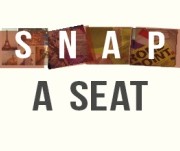Executive PA at Cactus, Cecilia Harvey, tells us about her week in Barcelona enjoying the Mediterranean sunshine and indulging in local culinary delights…all whilst attending a local language school.
Butterflies fluttered in my stomach as I boarded the train headed for Gatwick airport. Drizzle on the windows made me smile, knowing I was heading for a 28 degree heat. Since the birth of my children, I had never been away by myself, let alone do something “just for me”. Having not ever been to Barcelona either, I could hardly contain my excitement.
What a luxury to be in the airport alone, to sit and have a coffee and read my Lonely Planet guide. I carefully planned my itinerary for each day, knowing which sites I definitely wanted to see. I also knew that Friday was a holiday in Spain and there would be no classes that day. For that day, beach!
As I left behind the storm that was brewing in the south east, and that had been announced weeks before, I heard people talking on the plane about advice they left to their friends and families about “battening down the hatches”…. The plane did go through some very strong turbulence, and with my stomach in my throat, I just closed my eyes and couldn’t stop smiling.
Landing in Barcelona in the heat was brilliant, my skin immediately thirsty for that Vitamin D. I was in no rush, but knew exactly where I was headed. The Aerobus is fantastic; it leaves from both Terminals at Barcelona’s El Prat airport and takes you right to the centre of the city. I just soaked up the sites as the very easy 30 minute journey left me standing in the beautiful and buzzing Plaça de Catalunya. As I walked down toward my apartment, I purposely chose a quiet street (well, quiet doesn’t really exist in central Barcelona!) but not down one of the main ones, let’s say, as I wanted to leave the world famous “La Rambla” for when I had time to soak up everything around me.
Settling into my flat for the week
I got to my address, and a very sweet girl called Lisa from the school, International House, was there to greet me. She gave me the keys to my room, detailed some basic rules and instructions and left. Wow…I had a real flashback to my student apartment at Uni. Very well equipped, the apartment gave onto a very noisy and echoey set of courtyards, all connected like a maze. My room was basic but incredibly clean. All I needed really, as I wasn’t planning on spending much time in it anyway!
I went out looking for somewhere to buy some basic essentials for breakfast the following day, but to no avail, as it was by then quite late on a Sunday afternoon. Instead, I stumbled across the wonderful “Cuines de Santa Caterina” – a well know eatery at the edges of a wonderful market, the Mercado de Santa Caterina. Unsure if I was hungry yet, I walked around, passed the Cathedral and through some streets, all buzzing with tourists and residents alike, going about their business.
Back at the flat, I was unpacking my case and heard the front door…it was Uli, one of my flatmates! From Bremen, Uli had a really interesting background. I then met Katja, a Danish girl who was to be my other flat mate, although I didn’t see her very much at all. Uli and I chatted about our children and about why and how we were there. After deciding we were both hungry, we decided to go and grab something to eat. He had also arrived that day and like me, not managed to find anywhere to get any food. We went to the Cuines de Santa Caterina and I indulged in a local beer, grilled squid and fried artichoke hearts. What a culinary delight that was!
The following morning I turned up at International House, just 5 minutes round the corner from the flat having passed the visually stunning Palau de Música Catalana. I didn’t have opportunity then to spend more time, feasting my eyes on the intricate detail in the décor of the building….but it was on my list, so I knew I would return.
First day at the language school
At the school, all the new students were welcomed and had to take both written and oral tests after which we were all allocated our classes and teachers. In between tests, we were all sent upstairs for 20 mins to the school café, run by a woman whom I can only describe as a “force of nature”. The orders came in, thick and fast, both from us newbies and all the other students who by that time were taking their morning break. I sat on the outside terrace in full sun with my espresso. Fabulous!
My class was run by Marco, a born and bred Catalan guy who made it even more interesting, as he knew and understood the differences and could explain them to us as well as ensure we knew which was Castellano and which was Catalán. There were only five of us in the class which was fantastic, and I knew I would be challenged mentally as not only was the course labelled “intensive” but my level was Upper Intermediate III and my classmates had already been there for 2 or more weeks. Most of the days following that, I came out of the school, my head buzzing and hurting from the bombardment of information. The verbs really challenged me as they differ so much from Italian ones (I am half Italian) and there are so many more tenses to remember and so many more subtleties. We had a lot of course work which most days I decided to do immediately after school, so I could then just relax and enjoy the free afternoons and evening. This didn’t always go to plan, as the Mercado de Santa Caterina lured me in on my second day and I found myself eating tapas in the Cuines again….
Excursions & wanderings…
The school organised some excursions which on a couple of occasions I joined. The first to the Barrio de Gracia, and the other to the museum of Catalan History. Both incredibly worthwhile going to with local people as your guide as they knew a lot more than any written guide will illustrate. The Barrio de Gracia is very trendy and has a multitude of small restaurants and cafés of different cuisines and wonderful little artisanal shops which are gems. My favourite site there was the Casa Vicens – architecturally mesmerizing. The residents of Gracia are very proud to be “from Gracia” and they have various parties and celebrations, which are different in each street! The museum of Catalan History was very interesting. Created with a multitude of interactive features, it was designed with all ages in mind. Incredibly interesting actually for a foreigner to see just how much Barcelona has contributed to many types of trades which not only still exist in Barcelona and to a wider extent, Spain, but how the city was a pioneer in a lot of them.
I achieved so much in six days: I walked down the Rambla, just with the intent of subjecting my ears to the local language and setting my brain into “Spanish mode” – and it worked. I shopped in the famous Mercado de la Boqueria, where my Lonely Planet didn’t fail me: an explosion of colours, sounds and smells, it became my daily favourite spot to be. I marvelled at Gaudi’s creations in all shapes and sizes; I met some lovely people and ate delicious food in tapas bars in little plaças where you know only the locals go. I walked along the beach and soaked up the rays and the warmth. I sat on grass verges by the marina and listened to a band playing and people dancing to the captivating rhythms and watched street dancers and breakdancers outside the Cathedral.
This experience has enriched me in so many ways. First and foremost I have really progressed in my Spanish and plan to keep it up with a Cactus Skype course. Secondly I have seen some amazing places, art, museums and eaten delicious local dishes and met interesting and friendly people. Last but not least, I visited a city which was welcoming and alive and was blessed to go to a well organised school where the staff was extremely competent and friendly. I will be going back with my family in the not too distant future.
Cecilia took a 1-week General Spanish language course of 20 lessons in Barcelona. Cactus offers Spanish courses in many other locations across Spain and Latin America. Those wishing to learn the basics or brush up before they go can also take a Spanish evening course in the UK or the US.














